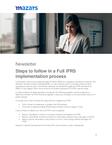
Steps to follow in a Full IFRS implementation process
In order to define the ideal regulatory framework, the following aspects must be analyzed to determine whether full IFRS should be applied in case your company is not a securities issuer or of public interest:
If it meets one or both of these two requirements, it applies full IFRS:
- If the number of employees is greater than 200 workers.
- The value of assets exceeds 30,000 legal monthly minimum wages in force.
If any of these conditions are met, full IFRS must be applied:
- Being a subsidiary or branch of a foreign company that applies full IFRS.
- Being a subordinate or parent company of a domestic company that must apply full IFRS.
- Being a parent, associate or joint venture of one or more foreign entities that apply full IFRS.
Imports or exports that represent more than 50% of purchases or sales, respectively.
If you do not meet any of the above requirements, but voluntarily want to apply full IFRS, you may do so.
This regulatory change is an important step for companies seeking to comply with a more rigorous presentation of financial statements; however, it is important to consider that if your company applies IFRS for SMEs, it must remain in the regulatory framework used on a voluntary basis for a period of three years.
The challenges and considerations that companies must face in this transition process are mainly:
- Plan in detail the activities required, time, resources and personnel involved in the process. The schedule should define the dates of the opening statement of financial position, transition period and application.
- Identify key differences between the current regulatory framework and the one to be applied, such as financial instruments, portfolio impairment model, financial leases, revenue recognition, among others.
- Analyze the financial impacts, mainly those related to the book value of assets, liabilities, due to different measurement methods and how this may influence financial results and key indicators (EBITDA, indebtedness, margins).
- Conduct a training plan for employees who may require additional training to properly understand and apply the new standards.
- Consider how this change will affect stakeholder decisions. More detailed and transparent financial reporting can improve the perception of the company and strengthen market confidence.
- Develop accounting policies under the new standard framework that address initial measurement, subsequent measurement, exemptions and disclosures. Full IFRS require more detailed disclosures and breakdowns in the financial statements to provide more complete information to the users of financial information.
- Develop accounting policies under the new regulatory framework that contemplate initial measurement, subsequent measurement, exemptions and disclosures. Full IFRS require a greater amount of disclosures and detailed breakdowns in the financial statements to provide more complete information to the users of the financial information.
- Perform opening and transition spreadsheets with defined periods including balance in IFRS SMEs and implementation adjustments. Each adjustment must have its working paper with analysis, calculations and technical memorandums that support the adjustment.
- Preparation of financial statements under full IFRS and disclosures with all requirements.
A successful implementation process of the International Financial Reporting Standards (IFRS) requires planning, coordination and commitment. For this reason, Mazars Colombia has a fully trained and committed team, ready to meet your needs through the diagnostic phase, implementation, training and comprehensive support for the process to be completely successful.


